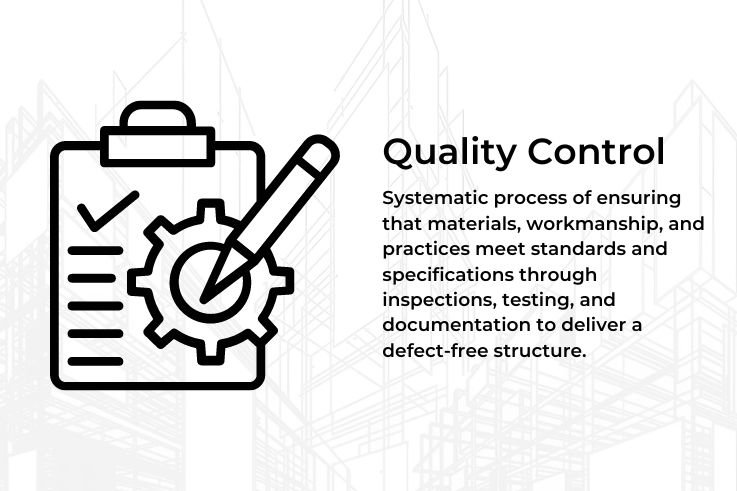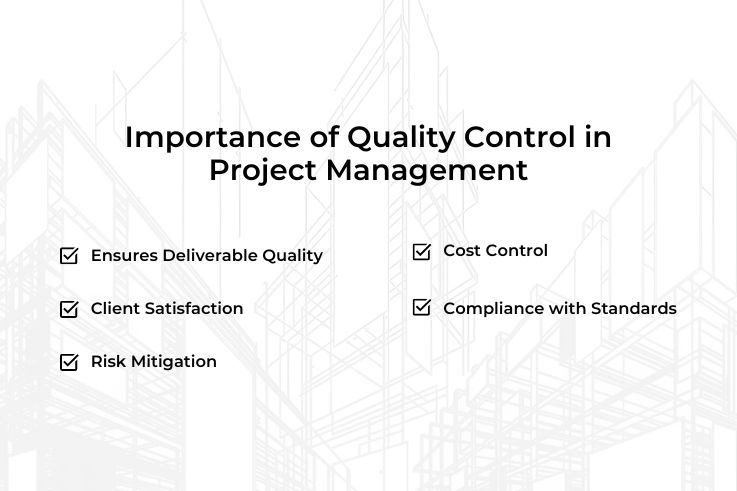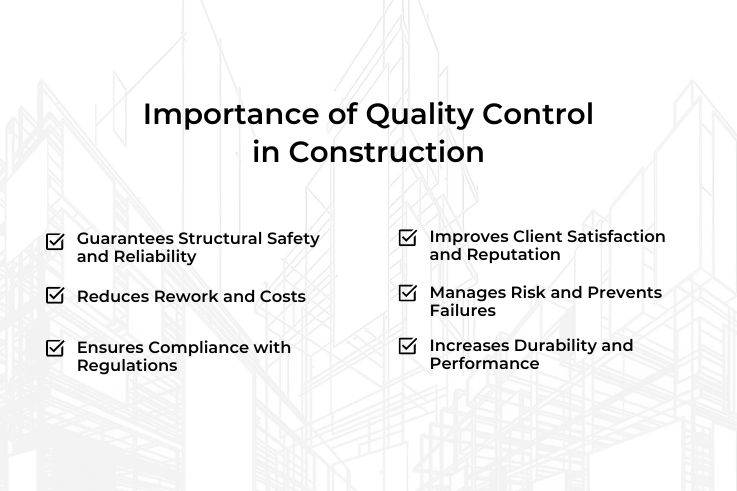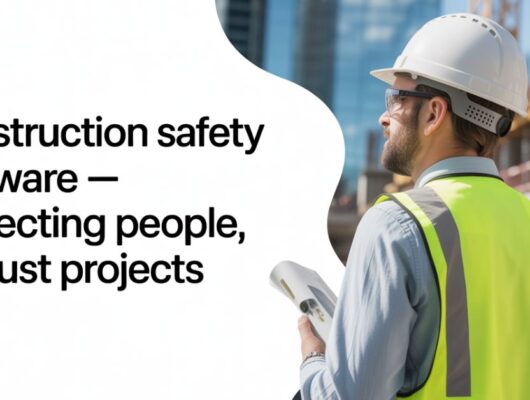Quality Control (QC) is a process by which businesses ensure that their products or services meet specific quality standards and customer expectations. It involves systematic activities, including inspection, testing, and validation, throughout the production or service delivery process to detect and correct any defects. QC aims to maintain consistency, enhance efficiency, and ensure the final output aligns with the required specifications. In construction, for instance, quality control ensures that materials, workmanship, and techniques adhere to project standards, ensuring safety, durability, and regulatory compliance.

Importance of Quality Control in Project Management

Quality Control (QC) is crucial in project management for several reasons:
- Ensures Deliverable Quality:
QC ensures that the project’s outputs (products, services, or results) meet the required standards and specifications, avoiding costly rework or defects.
- Client Satisfaction:
Consistently high-quality deliverables increase client satisfaction, fostering trust and future collaboration.
- Risk Mitigation:
By identifying defects early, QC reduces the risk of major issues later in the project, which could lead to delays, cost overruns, or project failure.
- Cost Control:
Preventing defects through QC reduces rework, wastage, and delays, helping to control the project’s budget.
- Compliance with Standards:
QC ensures that all project deliverables meet regulatory requirements, industry standards, and contractual obligations.
Must Read: Pre-Job Training – A Relay Race Advantage
Importance of Quality Control in Construction

Quality Control (QC) is vital in construction because it ensures the overall quality, safety, and longevity of a project. Here’s a detailed breakdown of why it’s essential:
- Guarantees Structural Safety and Reliability:
QC ensures that all construction materials, methods, and workmanship align with the approved design and engineering specifications. This prevents weaknesses in the structure, ensuring it is strong enough to endure both environmental and load stresses, safeguarding its users.
- Reduces Rework and Costs:
By identifying potential defects or deviations during construction, QC helps prevent costly rework, repairs, or delays later in the project. Catching issues early on helps avoid expensive fixes and keeps the project within budget and on schedule.
- Ensures Compliance with Regulations:
Construction projects must adhere to local, national, and international building codes and safety regulations. QC ensures that all aspects of the project, from materials to execution, comply with these legal standards, avoiding fines, penalties, or project shutdowns.
- Improves Client Satisfaction and Reputation:
Delivering a high-quality, defect-free project enhances the contractor’s reputation and builds client trust. A successful QC system ensures that the project meets or exceeds client expectations, leading to potential future contracts and a positive industry reputation.
- Manages Risk and Prevents Failures:
QC is critical for detecting and addressing problems before they become safety hazards. By consistently monitoring the quality of materials and construction practices, QC reduces the risk of accidents, structural failures, and legal liabilities, thus protecting both workers and users.
- Increases Durability and Performance:
Effective quality control ensures that the finished structure is not only functional but also long-lasting. Ensuring proper materials and craftsmanship contributes to the building’s durability, lowering long-term maintenance costs and extending the lifespan of the structure.
How Quality Control Practices are helpful during Construction
Quality control (QC) practices are helpful throughout the construction process, from pre-construction planning to post-construction assessments. Here’s a detailed breakdown of when and how QC practices are beneficial at different stages of construction:
- Pre-Construction Phase
Before construction begins, during the planning and design stages, QC includes
- Specification Review: QC involves reviewing design plans and specifications to ensure they meet regulatory standards and client expectations.
- Material Selection: Verifying the quality and appropriateness of materials before they are ordered, ensuring they align with project requirements.
- Supplier and Contractor Evaluation: QC helps in assessing suppliers and subcontractors for their ability to meet quality standards. Contracts and procurement processes are also evaluated for compliance with quality guidelines.
This ensures that any potential quality issues are addressed before construction starts, avoiding costly revisions or delays later.
2. During Material Procurement
During the acquisition of construction materials. QC includes,
- Material Inspection: QC involves inspecting materials upon delivery to ensure they meet project specifications and are free from defects.
- Sample Testing: QC practices include sample testing of materials (e.g., concrete, steel) to verify their strength and compliance with industry standards.
Helps prevent the use of substandard materials, which could compromise the safety and durability of the project.
3. Foundation and Structural Work
During the construction of the foundation and structural framework QC includes,
- On-Site Inspections: QC teams regularly inspect the construction site to ensure that foundational work and structural elements (e.g., columns, beams) are executed as per design specifications and safety standards.
- Monitoring Concrete Pouring: Ensuring the concrete mix is correct, monitoring curing times, and preventing cracks or weaknesses in the foundation.
Ensures the stability and strength of the structure, preventing potential foundation failures or structural collapses.
4. During Installation of Services and Systems
As mechanical, electrical, plumbing, and HVAC systems are installed QC includes,
- System Testing: QC involves testing electrical, plumbing, and HVAC systems to ensure they are installed correctly and function as required.
- Compliance Checks: Ensuring that installations meet building codes, energy efficiency standards, and safety regulations.
Prevents issues like electrical failures, water leaks, or system malfunctions that could disrupt operations or lead to safety hazards after the building is completed.
5. During Finishing Work
During interior and exterior finishing stages, such as painting, flooring, and roofing QC includes,
- Surface Inspections: Checking the quality of finishes, ensuring surfaces are even, properly applied, and free from defects.
- Quality of Fixtures and Fittings: Verifying that doors, windows, tiles, and other fixtures are installed with precision and according to design specifications.
Ensures aesthetic quality and functionality, preventing costly rework on the finishing details.
6. Post-Construction Phase
After construction is complete but before project handover QC includes,
- Final Inspections: QC involves conducting comprehensive final inspections to ensure the entire project meets the design, quality, and safety requirements.
- Testing Systems: Performing operational tests on systems like elevators, lighting, and security systems to confirm they function correctly.
- Punch Lists: A QC punch list is created, identifying any minor issues or defects that need to be corrected before project delivery.
Ensures the project is fully compliant and ready for use, reducing the likelihood of future defects or performance issues.
7. During Maintenance and Warranty Period
After the building is occupied or in use QC includes,
- Warranty Inspections: QC includes periodic inspections during the warranty period to detect early signs of wear or defects in systems, materials, or workmanship.
- Performance Monitoring: Continuous monitoring of the building’s performance, ensuring that it meets the long-term operational standards specified in the contract.
Helps address any issues that arise after occupancy, protecting the project’s long-term integrity and reducing repair costs for the owner.
Conclusion
Quality Control (QC) is an essential component in both project management and the construction industry, ensuring that deliverables meet the highest standards. It fosters client satisfaction by preventing defects, reducing risks, and managing costs effectively. In construction, QC is vital for guaranteeing structural integrity, regulatory compliance, and the proper use of materials, which collectively contribute to a project’s longevity and reliability. By applying QC practices at every stage—from pre-construction planning through post-construction maintenance—projects can avoid costly rework, address potential issues early, and enhance overall efficiency. Ultimately, QC ensures that the final product is safe, high-quality, and built to last, while also boosting long-term performance and client trust.









2 Comments